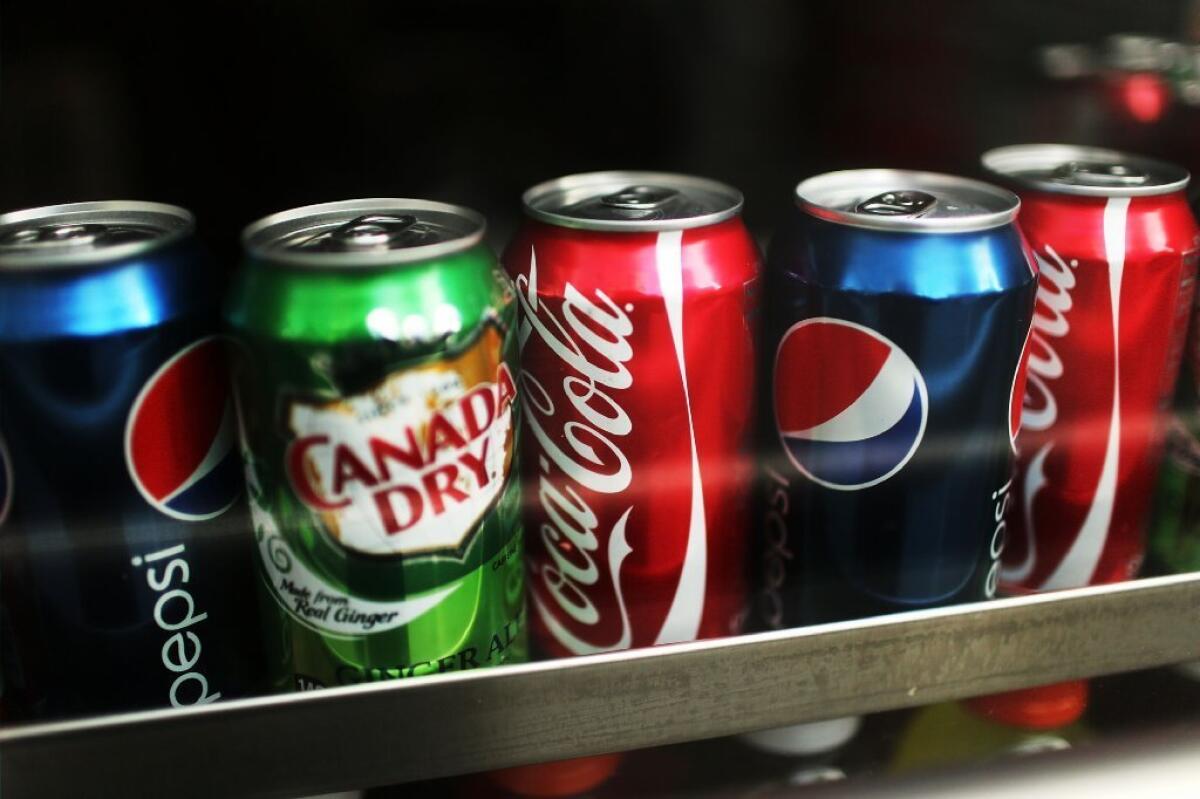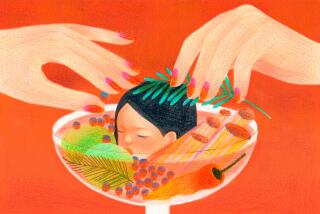Opinion: Soda warning labels: The cons outweigh the pros

Several years ago, legislation was circulating in Sacramento to ban the sale of sodas in public schools. Soda is certainly among the junkiest of junk foods, not something that schools should ever have encouraged students to drink, no matter how much money they raked in from the Coca-Cola Bottling Co.
But the bill allowed the continued sale of juice, including apple juice, which has about the same calories and sugar as soda and very little in the way of nutrition. Why allow one and not the other, I asked the legislator’s aide?
Because natural sugar is digested differently from added sugar, she said. No, it isn’t, I countered. Yes, it is, she said. No, it really isn’t, I said, and emailed her a few articles to bolster my point.
We’re foundering when it comes to fostering a healthier way of eating for our country, even though we have increasing evidence that the decisions we make day to day — whether to smoke, what to eat, how much to exercise — have an extraordinary effect on our health. It’s all complicated by the fact that good diet research is hard to come by because nutrition and exercise are complicated subjects, much more so than tobacco.
We do know more now, though, about soda and other drinks with large amounts of sugar, and none of it is good. The drinks add significant calories to our diet, though not as much, on average, as they did 10 to 15 years ago. There is some evidence that the body doesn’t do a good job of recognizing the calories it gets from sugar in liquid form; we don’t tend to feel as full after a soda than if we’d gotten those 100-plus calories from food, and thus we still feel hungry. Food scientists are concerned about the spikes and dips in blood sugar caused by the sugar jolt. And some newer studies indicate that people who drink soda are at higher risk for diabetes, even when they’re at the same body mass index as people who don’t drink soda.
Now the question is whether this is enough reason to pass a bill — SB 1000, to be exact — that would require warning labels on sodas akin to those that have been required for 50 years on cigarette packages.
This is a sensitive issue legally as well as nutritionally. It’s one thing to require nutrition and ingredients information on food so that consumers can make wise decisions, and sodas already provide clear information about their sugar calories and, in most cases, long list of artificial ingredients. But demanding that a company use its own container to advertise against itself goes a step further, into dicey territory. We do that with cigarettes, but their danger could not have been clearer. And cigarettes never did contain ingredients lists, not that most consumers would have known what to make of such a list.
At the same time, would that step into regulating soda companies’ freedom of speech perhaps reap benefits as great as the country’s war against tobacco has? Smoking rates have fallen dramatically since the warnings first were required on labels — although much of that drop might have more to do with persistent anti-smoking campaigns than with the labels themselves.
It’s possible that society could bring about a significant if not dramatic shift in public health if the labels got people to drink less soda. Maybe that would be worth any infringement on the companies involved. But its success is far from guaranteed. I still think most people know that sodas aren’t good for them. Soda consumption has been falling in recent years, though young people appear to be consuming more. On the other hand, teenagers and young adults strike me as the consumers least likely to pay attention to a warning label.
The other question is whether the science against soda is as solid as the findings against smoking were in the 1960s. Even if soda drinkers are more likely to develop Type 2 diabetes than people of equal girth who don’t drink soda, does this mean that the soda was the determining factor? Or could there be another element in all this that we don’t see — these are generally called confounding factors — that predisposes a person both to diabetes and to drinking soda? The research is interesting, but we need to know more.
One of the reasons we have more evidence against soda than against other possibly problematic food is that more research has been conducted on it. If those studies had focused on apple juice, it’s quite possible they would have found an equal link between juice consumption and diabetes, even though juice would not be required to carry a label. To be fair, though, soda is cheaper and, as a result, people drink more of it than they do of juice.
Still, the reasons for rejecting soda warning labels weigh more heavily at this time — pun intended — than the possible advantages. The state has within its grasp more effective ways to reduce consumption of sugar in general and sodas in particular than by regulating soda labeling. A state public-service campaign against soda consumption that shows consumers the evidence in clear and dramatic form is more likely to get their attention than a pro-forma label. Yes, such a campaign would cost money, but if the state wants people to stop certain behaviors, it’s the state’s responsibility to bear the cost.
More to Read
A cure for the common opinion
Get thought-provoking perspectives with our weekly newsletter.
You may occasionally receive promotional content from the Los Angeles Times.











